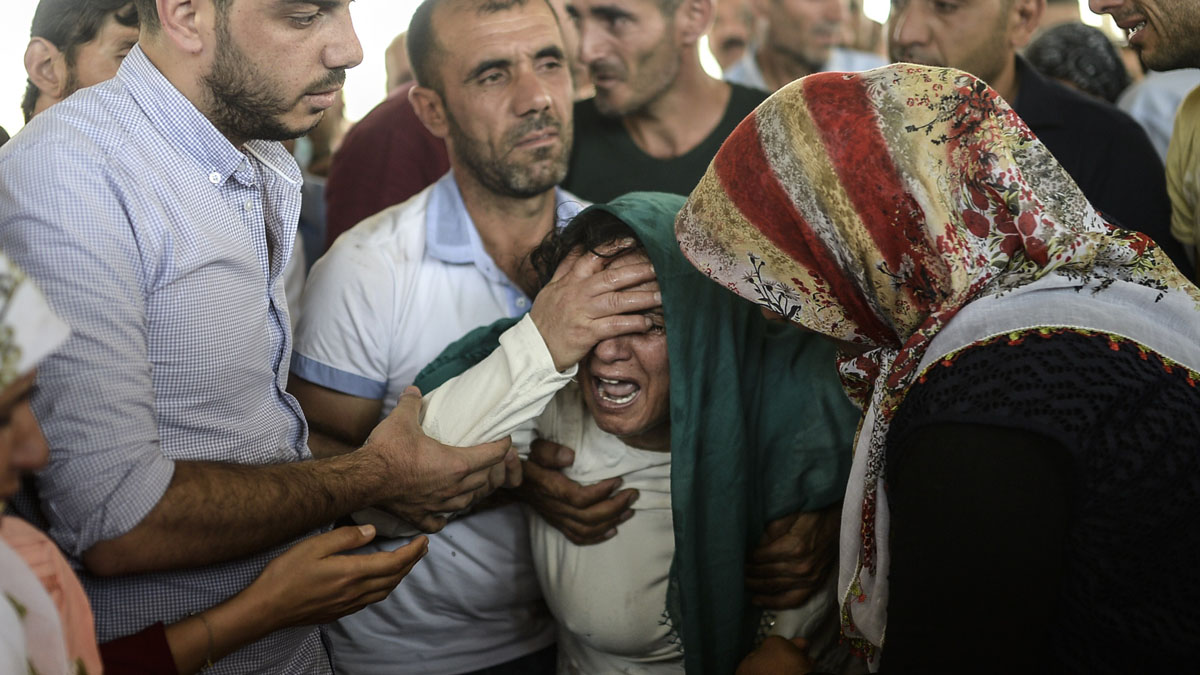Turkey to boost security after suicide attack kills 32
Another 100 people were injured in the bomb blast believed to have been carried out by Islamic State

A free daily email with the biggest news stories of the day – and the best features from TheWeek.com
You are now subscribed
Your newsletter sign-up was successful
The Turkish government has vowed to increase security along its border with Syria after a suicide bombing killed at least 32 people in the Kurdish town of Suruc.
The explosion occurred in the middle of day outside a cultural centre just six miles from the Syrian border, injuring around 100 people.
Turkish authorities say they have identified the suspected attacker and their links to local and international groups are being investigated. The attack was "retaliation for the Turkish government's efforts to fight terrorism," said one senior official.
The Week
Escape your echo chamber. Get the facts behind the news, plus analysis from multiple perspectives.

Sign up for The Week's Free Newsletters
From our morning news briefing to a weekly Good News Newsletter, get the best of The Week delivered directly to your inbox.
From our morning news briefing to a weekly Good News Newsletter, get the best of The Week delivered directly to your inbox.
The government believes it was carried out by a suicide bomber with links to Islamic State, although the terrorist group has yet to claim responsibility for the massacre.
President Recep Tayyip Erdogan condemned the bomb attack and those "who conducted this brutality". "Terror has no religion, no country, no race," he said.
If Islamic State's role in the bombing is confirmed, it would be one of the group's deadliest strikes on Turkish soil to date, the Daily Telegraph reports.
The majority of the victims were young student activists who were going to deliver aid to the nearby Syrian town of Kobane, which Kurdish fighters regained from Islamic State militants last year.
A free daily email with the biggest news stories of the day – and the best features from TheWeek.com
They had planned to travel to Kobane to deliver toys, plant a memorial forest, as well as build a library and a playground, The Guardian reports.
The attack prompted widespread protests in Istanbul, with demonstrators blaming the government for not doing enough to protect the Kurdish population along the Syrian border.
The bloodshed could prompt the Turkish government – which remains reluctant to get involved in the bombing of IS targets in Syria and Iraq – to take action against the extremists, analysts told the Financial Times.
"Ankara cannot afford to let down its guard regarding IS otherwise this could spiral into a Turkish conflict," warned Nigar Goksel, senior Turkey analyst at International Crisis Group.
-
 How the FCC’s ‘equal time’ rule works
How the FCC’s ‘equal time’ rule worksIn the Spotlight The law is at the heart of the Colbert-CBS conflict
-
 What is the endgame in the DHS shutdown?
What is the endgame in the DHS shutdown?Today’s Big Question Democrats want to rein in ICE’s immigration crackdown
-
 ‘Poor time management isn’t just an inconvenience’
‘Poor time management isn’t just an inconvenience’Instant Opinion Opinion, comment and editorials of the day
-
 Epstein files topple law CEO, roil UK government
Epstein files topple law CEO, roil UK governmentSpeed Read Peter Mandelson, Britain’s former ambassador to the US, is caught up in the scandal
-
 Iran and US prepare to meet after skirmishes
Iran and US prepare to meet after skirmishesSpeed Read The incident comes amid heightened tensions in the Middle East
-
 Syria’s Kurds: abandoned by their US ally
Syria’s Kurds: abandoned by their US allyTalking Point Ahmed al-Sharaa’s lightning offensive against Syrian Kurdistan belies his promise to respect the country’s ethnic minorities
-
 Israel retrieves final hostage’s body from Gaza
Israel retrieves final hostage’s body from GazaSpeed Read The 24-year-old police officer was killed during the initial Hamas attack
-
 China’s Xi targets top general in growing purge
China’s Xi targets top general in growing purgeSpeed Read Zhang Youxia is being investigated over ‘grave violations’ of the law
-
 Syria’s Islamic State problem
Syria’s Islamic State problemIn The Spotlight Fragile security in prison camps leads to escape of IS fighters
-
 Panama and Canada are negotiating over a crucial copper mine
Panama and Canada are negotiating over a crucial copper mineIn the Spotlight Panama is set to make a final decision on the mine this summer
-
 Why Greenland’s natural resources are nearly impossible to mine
Why Greenland’s natural resources are nearly impossible to mineThe Explainer The country’s natural landscape makes the task extremely difficult